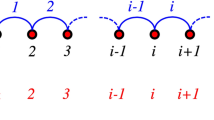Abstract
The 10th edition of the Global Trajectory Optimization Competition considered the problem of the galaxy settlement wherein competitors from all over the world were expected to design the trajectories of different settler vessels to maximize the given multi-faceted merit function. The synthesis methods used by the winning team, led jointly by the National University of Defense Technology (NUDT) and Xi’an Satellite Control Center (XSCC), are described along with a greedy search method and the improved solution obtained by University of Jena. Specifically, we presented a layout-first topology-second approach that allows an efficient settlement tree search guided by the pre-specified ideal spatial distribution. We also explained how the problem of constructing settlement trees can be modeled as the widely studied minimum spanning tree problem. Furthermore, University of Jena explored the possibility that a greedy search can generate even better settlement trees, based on the same initial conditions, when compared to that of the winning solution.
Similar content being viewed by others
Change history
11 February 2022
A Correction to this paper has been published: https://doi.org/10.1007/s42064-022-0136-2
References
Li, S., Huang, X. X., Yang, B. Review of optimization methodologies in global and China trajectory optimization competitions. Progress in Aerospace Sciences, 2018, 102: 60–75.
Izzo, D., Hennes, D., Simões, L. F., Märtens, M. Designing complex interplanetary trajectories for the global trajectory optimization competitions. In: Space Engineering. Fasano G., Pintér J., Eds. Cham: Springer Nature Switzerland, 2016: 151–176.
Petropoulos, A. E., Gustafson, E. D., Whiffen, G. J., Anderson, B. D. GTOC X: Settlers of the galaxy problem description and summary of the results. In: Proceedings of AAS/AIAA Astrodynamics Specialist Conference, 2019: AAS 19–891.
Graham, R. L., Hell, P. On the history of the minimum spanning tree problem. IEEE Annals of the History of Computing, 1985, 7(1): 43–57.
Narula, S. C., Ho, C. A. Degree-constrained minimum spanning tree. Computers & Operations Research, 1980, 7(4): 239–249.
Kruskal, J. B. On the shortest spanning subtree of a graph and the traveling salesman problem. Proceedings of the American Mathematical Society, 1956, 7(1): 48.
Prim, R. C. Shortest connection networks and some generalizations. Bell System Technical Journal, 1957, 36(6): 1389–1401.
Dorigo, M., Birattari, M., Stutzle, T. Ant colony optimization. IEEE Computational Intelligence Magazine, 2006, 1(4): 28–39.
Luo, Y. Z., Shen, H. X., Huang, A. Y., Zhang, T. J., Zhu, Y. H., Li, Z., Shu, P., Sun, Z. J., Li, J. H., Li, Z. Y., et al. GTOC X: Results and methods of National University of Defense Technology and Xi’an Satellite Control Center. In: Proceedings of AAS/AIAA Astrodynamics Specialist Conference, 2019: AAS 19-899.
Neumann, F., Witt, C. Ant colony optimization and the minimum spanning tree problem. In: Learning and Intelligent Optimization. Maniezzo, V., Battiti, R., Watson J. P., Eds. Heidelberg: Springer-Verlag Berlin Heidelberg, 2008: 153–166.
Shyu, S. J., Yin, P. Y., Lin, B. M. T., Haouari, M. Ant-Tree: An ant colony optimization approach to the generalized minimum spanning tree problem. Journal of Experimental & Theoretical Artificial Intelligence, 2003, 15(1): 103–112.
Zhou, G. G., Gen, M. Genetic algorithm approach on multi-criteria minimum spanning tree problem. European Journal of Operational Research, 1999, 114(1): 141–152.
Acknowledgements
This study is supported by the National Natural Science Foundation of China (No. 11702330) and the National Science and Technology Innovation Special Zone Project.
Author information
Authors and Affiliations
Corresponding author
Additional information
Tian-Jiao Zhang received her Ph.D. degree in control science and engineering, in 2019, from Xi’an Jiaotong University. She has been a research fellow at State Key Laboratory of Astronautic Dynamics in Xi’an Satellite Control Center since 2009. Her current research interests include space mission design, trajectory optimization, and evolutionary computation.
Dietmar Wolz received his Ph.D. degree in engineering from Technical University of Berlin, Germany, in 1998. Since 2006 he has been collaborating with the University of Jena in the GTOC and CTOC competitions. His area of expertise is in interplanetary trajectory design and optimization. His current research interests are astrodynamics and optimization algorithms. He maintains an open source gradient-free optimization library.
Hong-Xin Shen received his Ph.D. degree in aerospace science and technology from the National University of Defense Technology, China, in 2014, and conducted study, respectively, in Politecnico di Torino from 2012 to 2013 as a visiting student, in Peking University from 2017 to 2019 as a postdoctoral fellow. Currently, he is an assistant professor of Xi’an Satellite Control Center. He is the winner of the 10th edition of the Global Trajectory Optimization Competition. His area of expertise is in trajectory optimization and astrodynamics. His current research interests are game theory and artificial intelligence.
Ya-Zhong Luo received his B.S., M.S., and Ph.D. degrees in aerospace engineering from the National University of Defense Technology, China, in 2001, 2003, and 2007, respectively. Since December 2013, he has been a professor in National University of Defense Technology. His current research interests include manned spaceflight mission planning, spacecraft dynamics and control, and evolutionary computation.
Rights and permissions
About this article
Cite this article
Zhang, TJ., Wolz, D., Shen, HX. et al. Spanning tree trajectory optimization in the galaxy space. Astrodyn 5, 27–37 (2021). https://doi.org/10.1007/s42064-020-0088-3
Received:
Accepted:
Published:
Issue Date:
DOI: https://doi.org/10.1007/s42064-020-0088-3




